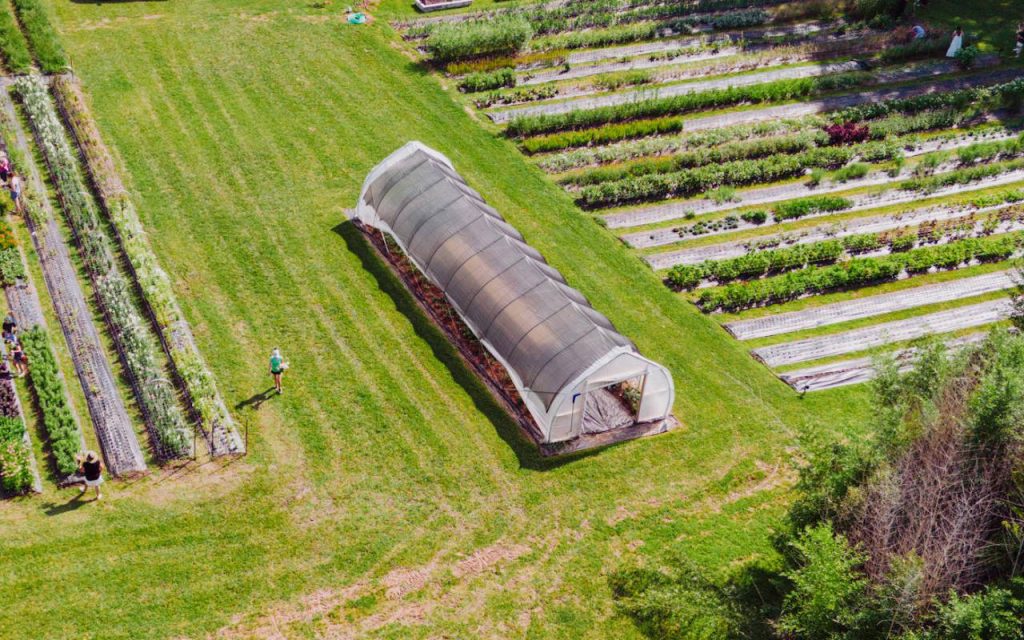If there’s one thing polythene excels at besides packaging, it’s agriculture.
Polythene is one of the most important materials that humans have for food production, gardening and horticulture. Grow bags, compost bags, irrigation and ground preparation – even weed killing – it’s all possible with polythene. But there’s another killer application for polythene in the world of growing things; polytunnels.
Let’s take a look at polytunnels in more detail, because while they might seem pretty simple, they’re actually quite complex and sensitive environments, where care and control are required.

What is a polytunnel?
A polytunnel is a greenhouse; except that instead of being made of glass, it’s made of a frame covered with transparent polythene film. Polytunnels give the same effect of a glass greenhouse, with just a simple frame and sheets of clear polythene. The advantages of polythene over glass are weight, strength, cost – and the maximum achievable size. Polytunnels can be absolutely enormous, covering entire stretches of farmland. They’re modular, too, and can be extended or shrunk down.
Polytunnels serve multiple purposes in agriculture and horticulture, but the main one is extending growing seasons or allowing non-native plants to grow. Polytunnels protect crops from frost, wind and excessive rain. They can allow higher temperatures and humidity to be achieved – creating a controlled environment that can be tuned to different kinds of plants. You can use a polytunnel to create the exact environment to grow a specific species, for earlier planting and later harvesting of crops.
They can also be used as animal shelters on farms and smallholdings, or as storage shelters. Polytunnels are a valuable asset for gardeners, too – providing protection for flowers and food plants, and working as weatherproof storage for gardening tools and soils.
And at the heart of it all is polythene; the ultra-versatile supermaterial that we make at NPF Packaging. So, is there anything special about polythene for polytunnels, or is it all just standard stuff? Well, it is quite a specialist area, but once you know the needs, it’s fairly straightforward to understand. First, let’s look at how polytunnels work, so we can understand what material requirements need to be met.
How polytunnels work
Clear polythene allows sunlight to shine through, including the sun’s ultraviolet (UV) radiation. The UV light passing into the polytunnel begins to warm things up; the ground, the plants, and the structure itself. The UV light is absorbed by much of the stuff inside the greenhouse, and it radiates heat away into the air. But the wavelength of light released into the air changes – from UV to infrared (IR).
IR light wavelengths are much longer. We can’t see them, but we can feel them as heat. Similarly, the transparent polythene is not nearly as transparent in the IR wavelength, so those waves of heat can’t escape easily through it. This causes a buildup of heat. The polytunnel becomes like an insulator, holding in all of that radiated heat because it cannot escape as effectively.
This is simplified, and controlling the temperature takes lots of work (sometimes even additional heating is needed) to keep it from getting too hot in daylight or too cold at night – but this is the basic principle of how polytunnels work.
And you may have noticed that UV light is the key thing driving the process.
Unfortunately, UV light damages polythene significantly, causing it to break down and become brittle. But this problem has been solved with UV inhibitors – special additives that stop UV light from destroying the polymer when exposed to sunlight. And that leads us to the first of our requirements for polythene for polytunnels.
Polythene requirements for polytunnels
-
UV resistant polythene
The polythene must have UVI additives to prevent damage from sunlight. Without this, the polythene will break down and become brittle.
-
Heavy duty polythene (700-800 gauge)
Because lots of tension and anchoring is required to build a polytunnel, and because it’ll be exposed to the elements, heavy duty polythene is recommended. 700-800 gauge is a good recommended range for this, depending on the size of the polytunnel.
-
Large sections
Large widths of polythene are required to cover the polytunnel properly. NPF Packaging has polythene sheeting in widths of up to 9.6 metres. Some specialist polytunnel manufacturers are able to go higher. Polythene can also be welded to create any size of sheet – the sky’s the limit!
Can you build your own polytunnel?
There are plenty of pre-built polytunnels and kits available on the market. But some people prefer to build their own for customisation, size – or just for fun! Building a DIY polytunnel can be a rewarding project, but it’s not exactly easy. And you’ll definitely need some helping hands…
Besides heavy duty, UV resistant polythene film, you’ll need something to build hoops or frames. Some people use PVC pipe, but metal framework is more common. You could also use timber, if you’re good with wood.
The process typically involves assembling the frame, securing the polythene cover, and anchoring the structure to the ground to ensure stability and safety. Anchoring is typically done by digging trenches, stamping the polythene taught into the ground, and then backfilling material on top.
For those interested in DIY polytunnel construction, resources like Premier Polytunnels and Sharpen Your Spades have loads of information and guidance.
Polythene for every application
NPF Packaging creates high-performance polythene products – including large section polythene for polytunnels, with UV resistant additives.
Get a quote now, or call us on 01773 820415 to start your order.


